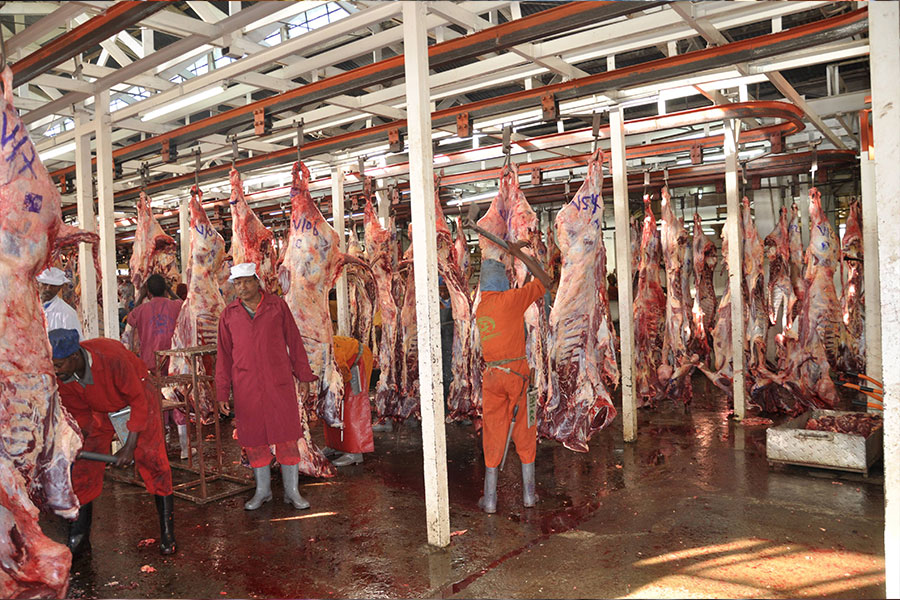
Radar | Aug 20,2022
Mar 14 , 2020
By GELILA SAMUEL ( FORTUNE STAFF WRITER
)
 Drafted by the Ministry of Agriculture, the bill will enable the rights holder of the protected variety to be paid a fee. The beneficiaries must have a certificate of competence for seed production and marketing to receive the payment.
Drafted by the Ministry of Agriculture, the bill will enable the rights holder of the protected variety to be paid a fee. The beneficiaries must have a certificate of competence for seed production and marketing to receive the payment. Seed breeders will get royalty fees when their variety is used for commercial purposes, according to a new regulation that was tabled to the Council of Ministers.
Drafted by the Ministry of Agriculture, the bill will enable the rights holder of the protected variety to be paid a fee. The beneficiaries must have a certificate of competence for seed production and marketing to receive the payment.
The draft, which has been in the making for the last year, was sent to the Council of Ministers for approval at the end of February. It was prepared by a task force composed of members from the Agricultural Transformation Agency (ATA), the Ministry of Agriculture and the Ethiopian Seeds Association.
Creating a field for competitive seed development, increasing productivity and benefiting breeders are the aims of the draft regulation, according to Tefera Zeray, advisor of agricultural development delivery at the ATA and the Ministry.
A public seed developer can determine the royalty fee to be paid to a breeder working at a public research institute. A variety developer can also set the payment if they alone produced the variety. However, the rates may not exceed the maximum ceiling to be set by the Ministry, which is currently drafting a directive to administer royalty fees that is expected to be enacted this June.
The bill also proposed the establishment of an organisation that will administer the plant breeder’s rights and an advisory board for the Institution. The Institution will also have the responsibility of granting the plant breeder’s rights and evaluating the variety description reports.
Even though the country legislated a proclamation three years ago protecting breeders' rights, it has never been protected, according to Tefera.
"Thus, the country doesn't have any registered protected seeds," Tefera said.
There are close to 1,200 seed varieties that have been released without protection.
Any person applying for a varietal examination has to submit qualitative, quantitative and pseudo qualitative characteristics of the variety descriptor to the Ministry of Agriculture. Then the Ministry will examine the novelty of the variety, the uniqueness of the variety, the size consistency, and the replication consistency.
During the examination period, the breeder will get a temporary permit for a year until the examination of the variety is concluded. And based on the verdict of the assessment, the temporary grant will be upheld or revoked. Then the Ministry will issue a certificate of plant breeder’s rights within 10 days of the approval of the varietal examination.
A breed from abroad is not required to pass through an examination process, however, the owner must bring a document that shows the date and year the variety was first protected.
The Ministry will license companies that will duplicate the seeds on behalf of a seed owner.
“We're taking a progressive step to start licensing a variety,” said Tefera.
When the rights holder is unable or unwilling to duplicate a seed that is crucial for ensuring food security and public health, the Ministry can issue a compulsory licensing deal asking that other companies bid for the right to duplicate the variety without waiving the holder's royalty fee.
The duration of the compulsory license depends on the production cycle of the crop. For annual crops it is four production seasons or cycles. If the owner wants to revoke the compulsory license, if they can satisfy the public's demand for the variety, and if they can refund the losses of the company that was working to duplicate the variety, they can take back the exclusive rights to the seed.
While a considerable number of breeders are operating in the country, there has not been a sufficient variety with different qualities released to the farmers, according to Tessema Alemayheu, director of Edget Farmer Seed Producer Cooperative Union.
Tessema says that the breeders are not encouraged to avail new varieties, since they are not receiving proper compensations and incentives.
"This costs the industry quality in the variety of the major crops," he said. "The enforcement of this law is crucial, as productivity is 50pc depending on the genetic potential of the seed."
Even though the move is enterprising, the question lies in the human capacity of the institution that will conduct the examination of the variety, according to an agricultural expert who commented under the condition of anonymity.
"There is a grey part in the lack of human resources and maintaining the procedures of the examination," said the expert. "The main aim shouldn't be about productivity. The seed's disease resistance and moisture handling capacity, among other qualities, adds more value to the seed."
PUBLISHED ON
Mar 14,2020 [ VOL
20 , NO
1037]

Radar | Aug 20,2022

Fortune News | Mar 26,2022

Radar | May 25,2024

Radar | May 02,2020

Fortune News | Jul 03,2021

Fortune News | Mar 07,2020

Fortune News | Apr 22,2022

Fortune News | Jul 11,2021

Exclusive Interviews | Oct 21,2023

Films Review | Apr 30,2021

Dec 22 , 2024 . By TIZITA SHEWAFERAW
Charged with transforming colossal state-owned enterprises into modern and competitiv...

Aug 18 , 2024 . By AKSAH ITALO
Although predictable Yonas Zerihun's job in the ride-hailing service is not immune to...

Jul 28 , 2024 . By TIZITA SHEWAFERAW
Unhabitual, perhaps too many, Samuel Gebreyohannes, 38, used to occasionally enjoy a couple of beers at breakfast. However, he recently swit...

Jul 13 , 2024 . By AKSAH ITALO
Investors who rely on tractors, trucks, and field vehicles for commuting, transporting commodities, and f...

Jul 5 , 2025
Six years ago, Ethiopia was the darling of international liberal commentators. A year...

Jun 28 , 2025
Meseret Damtie, the assertive auditor general, has never been shy about naming names...

Jun 21 , 2025
A well-worn adage says, “Budget is not destiny, but it is direction.” Examining t...

Jun 14 , 2025
Yet again, the Horn of Africa is bracing for trouble. A region already frayed by wars...